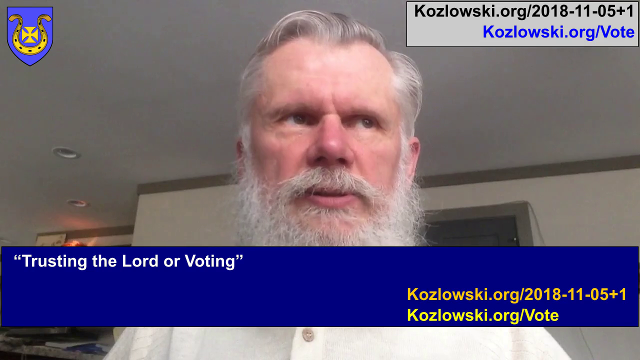|
||||||||||||||||||||||||||||||||||||||||||||||||||||||||||||||||||||||||||||||||||||||||||||||||||||||||||||||||||||||||||||||||||||||||||||||||
|
||||||
|
||||||
Transcript Greetings, Lets look at elections from the perspective of a follower of the Lord Jesus Christ. I distinguish that from the term Christian as it is simply a label rather than a conviction. The term “follower” is used to address those who actually do conform their lives as commanded by the Lord Jesus Christ as found in Scripture. This is the narrow gate Christian, as opposed to the wide gate Christian. “Wide Gate Christian” ● http://Kozlowski.org/WideGate I will use my own saga and repentance as evidence that I am not casting stones at anyone, but doing what I would have desired was done with me years ago and challenge my deeds from Scripture. A case will then be set before you from Scripture. If your lord is pragmatism, this will have no weight with you. If you trust in the Lord Jesus Christ and disagree, can you do so from Scripture in rational dialog? In the 1980s and 90s I was very active as a Christian in politics. I was following the crowd to promote Christian values in the government. I held leadership positions in pro-life organizations and eventually ran for US Congress. It was a learning experience and unlike a politician, I will point out where I was corrected, and were I was wrong. Somewhat like Jacob in Genesis 32, I wrestled with the Lord and as expected He wins. He set before me both His word and others to examine His word to point out my errors. I set the ideas before you in hope you will consider them and you will examine the Scriptures “to see if these things were so.” (Acts 17:11) This will include a review of Deuteronomy 17, 2 Kings 18, 1 Samuel 8, and Leviticus 19 with the understanding that the concepts proclaimed in the Scripture remain valid and applicable today. However, let me start with my saga, the insights gained, and my repentance. |
||||||
Christian American As a concerned Christian American in the mid-1990s I became more vocal and eventually involved in the political system. I became a part of the overtly Christian US Tax Payers party, later known as the Constitution Party, and even was the sole representative of the state of North Carolina at a national convention. It was suggested to me by a local Republican Party chair that I run as a Republican, since the USTP was not on the ballot, to seek the seat of the 12th District US House Representative Mel Watt. It was clearly a fool’s errand, and I was just the fool to do it. I did what was very unusual for 1998 and had a website for my campaign. The archive copy of most of it remains online. “Wide Gate Christian” ● http://1998.Kozlowski.org I issued challenges to my primary opponents as I mistakenly thought a rational dialog was important. While on a few issues my position has matured, the August 29, 1998 challenge, which is page 5 of the PDF, mentions the saga of Army Specialist Michael New and his refusal to dawn UN blue. I continue to stand with him and have since come to know his dad, Daniel, as a friend and a brother. “Michael New” ● http://www.MikeNew.com It became clear very quickly that it wasn’t a stand on a particular set of issues or values, but we had to win so our team has power and not them. This was a serious concern. Normally when questions were raised to my peers, especially by the press, a marketing response was given, rather than an exposition on why we stood where we stood. In a dialog with a reporter in his office he concluded his questions by stating that I was the first to ever actually answer the questions he asked. Watch most any news program and you will see that questions are simply platforms to then market your point and rally your supporters, or sometimes the questions are prepared to feed you. In an email dialog, also still a new concept for the time, one gentlemen stated since we disagreed on one position he would vote for the other guy. He did change his mind after our dialog but it was clear as I described to him, that when I took a solid stand on 10 issues and if the masses disagreed with one, they would vote for the guy who took no solid stands, even though we agreed on the other nine. This showed me the difference between what it is to be a politician who is marketed and a statesman who leads. I also got a call from a bank representative and was clueless at the time what that meant. I have since learned who owns the politicians and I was unwelcome. I did lose resoundingly in the primary. Even then we heard from both sides that this was the most important election ever because of some reason. We hear that for every election which should remind us of Solomon’s words in Ecclesiastes not only that “there is nothing new under the sun”, but also “there is no remembrance of former things”. We will see that lived out this election and the next. If you stand in a voting booth consider well if you are voting for your team, or for the principles you believe in. If your principles are based on the Scripture, lets look at what the Scripture tells us about our voting. I contend that I had the right principles, but the wrong method. |
||||||
Deuteronomy 17 In Deuteronomy 17, what we read as King is someone who reigns. In the Septuagint it is “archōn” or someone who rules. We do not need to read in that this is only a monarch, but applies to all who are in a position to reign or rule. We may be “setting a king” or voting, but it is the Lord who chooses. Whom He chooses is for His purpose, which may be for our good or otherwise. We are called to set one of our “brothers,” which is a term with numerous meanings. The narrowest is the child of the same parents. Then it expands to a child of one shared parent, to a relative, countrymen, or even the world. However, we are later shown that he should not be a foreigner, which limits the range. The next two verses speaks of the character of the person. Those that have or are drawn by power, alliances, sex drive and wealth are to be rejected. There is a requirement to write a personal copy of the Torah and read it. This is not a small task. There is no recorded ruler in Scripture that has met these qualifications. Do you know of any today? If not, is your vote for an unqualified person in disobedience to the Lord? |
||||||
2nd Kings 18 We see a great example of the difference between those who trust in man’s ways and those who trust in the Lord starting in 2nd Kings 18 when Hezekiah was king. Hezekiah first tries to buy off the Assyrian invaders by paying the demanded silver and gold. However, after making the payment the invasion still occurred. The Assyrian leader mocked the people and set before them the ideas of a worldly battle by offering horses and referring to other defeated peoples. However, by command of Hezekiah, the people kept silent and did nothing. It wasn’t a battle between people, but as would be seen, a battle against the Lord in whom the people trusted. Hezekiah did not meet with the Assyrians, but petitioned the Lord. Isaiah the prophet spoke to the king saying “Thus says the LORD, ‘Do not be afraid because of the words that you have heard’”. Words are said today to make us afraid, to fear those who want to control us, but we still are not commanded not to be afraid? It is in fear that we turn to the state for protection. It is in fear we make alliances to provide protection. It was the Lord alone who protected Judah during Hezekiah’s time. Is He any weaker or more feeble today? If He was Lord then and in His power alone confounded the invaders, is He not Lord today? In whom do we trust? Should be remain silent on the wall and trust the Lord, or do we vote for a worldly king to protect us? |
||||||
1st Samuel 8 In 1st Samuel 8 we see the people dismayed by judges who “turned aside after dishonest gain and took bribes and perverted justice.” In frustration the people wanted to be like others and have a king to judge them. The request was for a king to judge, not a king to rule. Verse seven should echo in your mind, causing great lament and terror when we read the Lord saying “for they have not rejected you, but they have rejected me from being king over them.” The people asked for a king to judge but instead got a king who rules over them. Then look at the cost in verses 11 through 17 and notice that we are paying all of them today. In verse 11 we see service in the military. In verse 12 we see the commanders of thousands and fifties, which is derived from Exodus 18 and Jethro’s suggestion, which was not a command of the Lord. We see the food and armaments industries serving those in power. In verse 13 we see occupations formed to serve leaders and not family or neighbors. We then see how people will be forced to give their property and labor to serve the leaders and middle management, a very real tax burden, and the glaring summary “you shall be his slaves.” Verse 18 states that the Lord will not answer to an appeal by the people because they choose a different king than the Lord. Consider that when you vote for someone to take a position of leadership. If you trust in the state and vote for a man today, tomorrow you will find “you shall be his slaves.” If you trust in the Lord, He is always near. Psa 145:18 The LORD is near to all who call upon Him, To all who call upon Him in truth. In whom do you trust? |
||||||
Leviticus 19 Consider one to the two greatest commandments as seen in Leviticus 19:18 “you shall love your neighbor as yourself: I am the LORD.” It is not because it seems right, but it is by the authority of the Lord that we are commanded to love our neighbor. Being politically involved, investing our time and resources in politics is a great burden and causes a lot of anxiety and stress. We have seen that it is also driven by our fear of man rather than our fear of the Lord. It takes a whole lot more time and resources to love our neighbor. Which is your priority? Is it better to use your time to get to know candidates or the Lord? Is it better to use your money to contribute to a campaign or the contribute to a neighbor? Is it better to spend the time to go to the voting booth or visit another human being created in the image of God? Is your trust in the state who you know will take from you, limit your freedom, and instill fear of your neighbors in you, or is your trust in the Lord who commands you to love? I have repented from political activity. I have repented from my trust in the state. I have repented from voting. There are too many people out there to love and encourage, I have no time to vote. |
||||||
|



